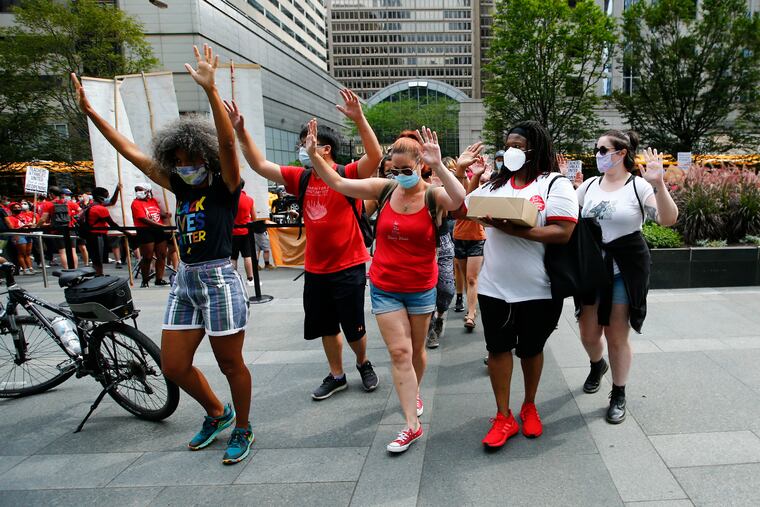Philly School District shouldn’t have to pay Comcast a dime to get kids online | Opinion
According to a 2018 report, Philly has the second worst internet access of any big city in the U.S., despite Comcast being headquartered here.

Nearly four months after Superintendent William R. Hite Jr. suggested Philly students wander in parking lots and outside of local businesses for public WiFi to access their virtual education, city officials finally released their plan to get every student internet access ahead of the coming school year, which will begin entirely online. The plan is a direct response to community outcry and pressure from City Council, demanding the city take immediate action to close the digital divide, which has been exacerbated by the pandemic.
While Comcast earns record-breaking profits during the pandemic on its broadband offerings, Philly has the second-worst internet access of any big city in the United States, according to a 2018 report. Additionally, 30% of Philadelphia households with school=aged children lack internet access, according to census data; 58% of households making under $70,000 do not have access. And there are racial disparities — 50% of Black households have internet access, while 74% of white households do.
PHLConnectED, the city’s plan to get kids and eventually all Philadelphians online, is a meaningful one. Unfortunately, the plan won’t get every student online and relies on Comcast sending a bill to the Philadelphia School District to cover the cost of bulk Internet Essentials accounts. Despite the fact that Comcast made a big show of the small $7 million donation it’s making to the partnership, city officials estimate they will spend $7.2 million over the two years on wired internet access, $5.1 million on hot spots, and $1.7 million on the digital navigator program.
» READ MORE: Protesters demand that Comcast provide internet access to all Philly kids
The plan is a meaningful step and the product of a concerted effort from city officials and Philly leaders. But it is not all that we need to get our kids connected. Unless we push Comcast to do far more, thousands of kids will remain offline while Comcast continues to exploit the pandemic for financial gain. Given how much Comcast saves by not paying its fair share of taxes in Philly, school districts shouldn’t have to pay a dime to get families online.
In the weeks following the stay-at-home order, officials asked Comcast to open their hot spots — a move that would vastly expand internet access for thousands of people struggling to get online. Comcast executives refused, claiming that it would negatively affect their customers’ service and that their network was not designed for public use. But the Internet Essentials Partnership Program profits from legislation that industry lobbyists fought to pass in Harrisburg 15 years ago, which preempts municipalities from building their own affordable broadband networks for public use by facilitating the use of the same network in exchange for a large payout from the school district, with a grant from Comcast.
Let’s remember: Comcast isn’t promising to subsidize internet access for families in need forever. When the current IEPP plans expire in two years, officials will be forced to negotiate with Comcast again.
At our organization, Movement Alliance Project, we’ve met with dozens of families who couldn’t get Comcast service because of back bills or old names on accounts. That meant that more than 1,000 kids were completely unaccounted for during the spring semester at the district. And even families that did get online couldn’t have more than one kid in video classes because of speed limitations. If Comcast does not improve Internet Essentials speeds before the fall, online education will be out of arm’s reach for thousands of households with multiple students.
Thousands of teachers, their aides, and paraprofessionals, who are underpaid and need broadband access to do their jobs, are excluded from this plan. Comcast could easily fix this oversight by making Internet Essentials free for everyone until two months after in-person education has resumed to ensure everyone can access broadband through the duration of the pandemic.
» READ MORE: Free internet coming for 35,000 Philly families: city, schools, Comcast to spend $17M on digital equity plan
Comcast’s greed wreaks havoc on Black, brown, and poor communities nationwide. In Baltimore, Detroit, and Oakland, advocates and organizers have been demanding more from Comcast but have gotten the same facade of altruism while their school districts shell out millions to Comcast as a participant of the Internet Essentials Partnership Program, which they characterize as enabling “cities, schools and nonprofits to collaborate to help fund and connect large numbers of K-12 students with broadband internet service and devices like laptops and tablets.”
These are meaningful additions. But by refusing to agree to the core community demands necessary to face the real challenges of this epidemic, the program is a thinly veiled attempt to transform a global disaster into a multiyear stream of revenue. Comcast must open its residential hot spots, increase Internet Essentials speeds, and make Internet Essentials completely free for everyone until two months after the pandemic has subsided.
Devren Washington is a senior policy organizer at Media Mobilizing Project.
This article has been updated to correct a statement that the district received money from Comcast Foundation. The district received a grant from Comcast Corporation.